Only 8 more days to go… time is going fast now. Tomorrow I am going to Ouagadouguo (capital of BF) to do some tourist shopping! This will be the second time that I will visit the capital and it will be good to spend a day in ‘city atmosphere’; because while they call Ouahigouya a city, you cannot actually call it that way: there is only one main road where there are street lights. The rest is sandy streets with no lights and most people have to get their water from a waterpoint in the streets.
Most of the anthropology students will return at the VU on 3 april. Well, I will be in the airplane at that moment! So I will not be able to attend the first class of Graduate Seminar and listen to all your stories about your experiences!!! This is why I have made a short ‘evaluation report’ to share my experiences anyway.
The first month was full of new impressions, everything was so interesting and wonderful, even though it cost me a lot of energy. I was warmly welcomed by the contact person in Ouahigouya and his family and in fact I have spent most of the period with them. I have lived in a small house on their court and they have been like a family to me.
Because I stayed with an African family; I got to know their culture pretty much from ‘inside’. I had to learn some of the local language Mooré because not everybody spoke French and I did not meet any white people for three months (except some times at a hotel, but I did not get to talk to them much.)
The family lives in the city of Ouahigouya, but they were born in village nearby; and they still have many relatives there. I decided to do my research in this village, called Nimpouya, and a neighbouring village: Risci.
In February I started to feel more ‘adapted’ to the food, the climate, the customs of the people and the life here in general. I could greet people in the local language; and understand a little of what they were saying.
I started to do profound research in the villages. There are two main ethnic groups in the region: the Mossi peasants and the Peul pastoralists. There is no electricity or running water. Because in the rural areas people only speak local languages, I have worked with an interpreter.
In March I got more and more problems with my interpreter. In fact, he assumed that after three weeks my research would be finished. Because he had a daily job as well, it got more and more difficult to find time for my research. Finally this resulted almost in an argument by the second week of March. I felt very frustrated, misunderstood and angry. I had the feeling that I did not control the situation anymore; and I did not know what was happening to me. I started to wonder why I chose Africa as my research site in the first place and I seriously wanted to go home!
The situation with my interpreter, in combination with the constantly rising temperature (during the day over 40 degrees! ), the food, the people and their way of communicating, the environment, the language… All the things I found so wonderful at first; now I was completely fed up with everything! This feeling lasted for almost a week and it felt like this week would never end.
But, fortunately, it passed, of course. And in the last weeks I could enjoy most things again, although the feeling of homesickness did not go away completely. Now that the end is near, I realise what a wonderful and unique experience this has been. It gives me a certain dramatic state of being: every time I pass something, I think this might be the last time I see those things. I have taken many pictures and have written everything down in my diary. This will hopefully help me after my return home, to deal with this experience.
See you all soon! Bye, Rosie
Monday, March 27, 2006
Thursday, March 23, 2006
Pictures!
After a terrible 'culture shock crisis' week, I feel much better now. Thanx everyone for your lovely emails and telephone calls: they really work!!
Now, finally, it is time for some pictures:
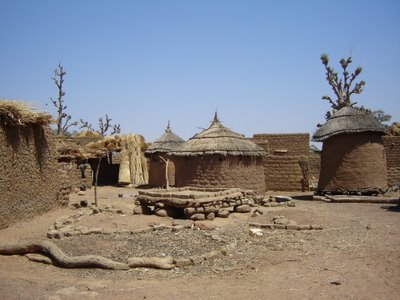
This is what the villages look like here: square mud houses for the villagers and round barns for stock.
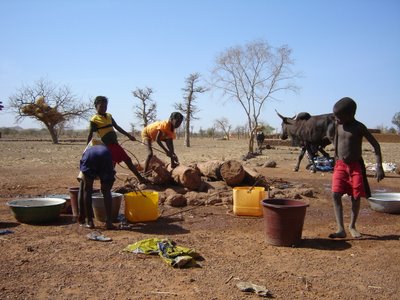
The day starts early in the village: women fetch water for the family and often their children give them a hand. Fetching water is a tough and dangerous job. This well is located in the village where I did most of my research, so I spent much of my time sitting here and watch the activities.
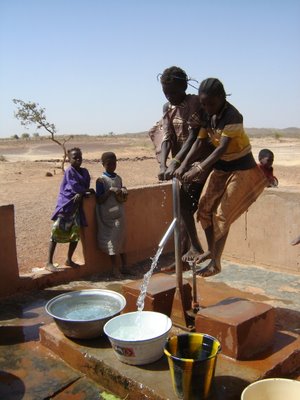
Most villages now also have a waterpump, like this one. It is further away than the wells, but fetching water from the pump is less dangerous and less exhausting. Besides, the water is cleaner: healthier to drink.
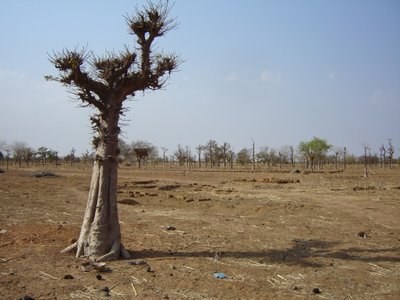
This was the view from my house in the village: flat, arid and dry...
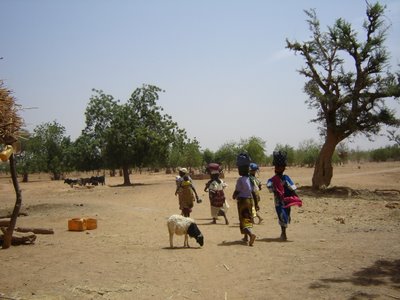
These women are going to the market in a village a few kilometres away, to sell their goods.
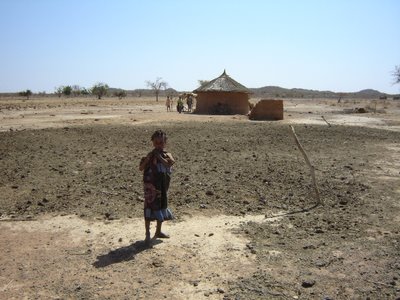
In this area live two ethnic groups: Mossi farmers and Fulani pastoralists. This little girl is a Fulani, and her house is in the background.
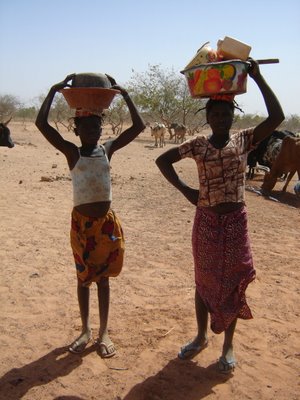
These girls are on their way to the waterpump to do the dishes.
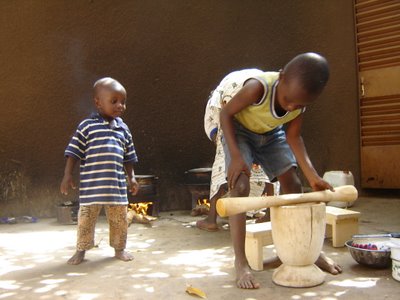
Back 'home' in Ouahigouya, I live with a guest family. These are my 'brothers': the oldest is Cheick (6) and the little one is Amir (2). I also have two 'sisters': Raicha and Faida.
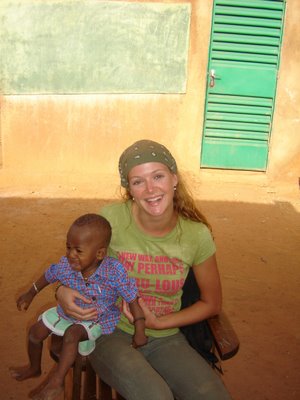
This is me little Farice, who is scared of me!
Now, finally, it is time for some pictures:

This is what the villages look like here: square mud houses for the villagers and round barns for stock.

The day starts early in the village: women fetch water for the family and often their children give them a hand. Fetching water is a tough and dangerous job. This well is located in the village where I did most of my research, so I spent much of my time sitting here and watch the activities.

Most villages now also have a waterpump, like this one. It is further away than the wells, but fetching water from the pump is less dangerous and less exhausting. Besides, the water is cleaner: healthier to drink.

This was the view from my house in the village: flat, arid and dry...

These women are going to the market in a village a few kilometres away, to sell their goods.

In this area live two ethnic groups: Mossi farmers and Fulani pastoralists. This little girl is a Fulani, and her house is in the background.

These girls are on their way to the waterpump to do the dishes.

Back 'home' in Ouahigouya, I live with a guest family. These are my 'brothers': the oldest is Cheick (6) and the little one is Amir (2). I also have two 'sisters': Raicha and Faida.

This is me little Farice, who is scared of me!
Wednesday, March 15, 2006
Communication problems: “Is this a piece of your brain??!”
After 2 months; some problems have come up... And they are not solved yet. However; I try to get a hold on the situation and to spend the last 2 1/2 weeks as good as I can.
Together with my interpreter I planned to spent the last week of February in Nimpouya. However, some unexpected activities came up which resulted in my interpreter being too busy to join me to the village. When we discussed this it turned out that for the coming weeks eight and nine he also did not have time to help me. However, in weeks five and six we had discussed this, also with his supervisor, and we agreed on a certain programme which gave us the chance to spend time in the villages for two more weeks.
These discussions got more tense in weeks seven and eight and finally resulted almost in an argument. The African way of communicating began to work on my nerves as well: all the time my interpreter kept saying ‘no problem’ but there were indeed serious problems! I have the feeling that nobody understands me and my interpreter, who just had begun to become a good friend, I saw now as only an obstacle for my research.
Maybe these problems are being ‘feeded’ also by the fact that since these weeks I have seriously had the feeling of ‘culture shock’. Everything costs too much energy, everybody gets on my nerves all the time. The food, the temperature, the people, the environment, I have been fed up with basically everything and I long to see, hear and taste something familiar for a change.
Besides, I find doing research with an interpreter is very difficult. Sometimes it works fine, but there are times that it does not work at all. This has, in my opinion, several reasons. First of all, my interpreter is familiar with the villages where I am doing research. In the beginning I regarded this as an advantage. The interviewed persons often were relatives or friends. Which made that we had good conversations with these people. But a disadvantage is that my interpreter often chit-chatted with this person, in between my questions. This made me feel that, when I posed another question, I interrupted in their conversation. I talked about this with my interpreter, but he does not seem to understand the problem. If the interviewed person was not familiar with my interpreter, the conversations were more formal and my interpreter kept the translations short, which made me feel that he did not translate all that had been said.
Besides this, I find it also difficult to do research with an interpreter because I do not only have to make sure that the interviewed person has told me everything he or she knows about the subject, I also have to check whether the interpreter has translated everything that has been said, or even, whether he has not added some information himself to make the answer more complete! Now that I start to learn more and more of the local language, I have discovered this.
I have therefore tried to find an other interpreter for the time that is left. I found someone and we went to the villages together. But it was not the same. He did not understand me quite well, he did not understand my purpose of research and the way that the interviews should be held. Moreover, I had the feeling that he did not translate the responds exactly as the interviewed person had answered them. Besides, this man does not speak the language of the pastoralists, so I could only do interviews with Mossi people. Therefore, I found this was not the solution to my problem.
But all in all I try to make the best of it and to solve the problems as soon as possible. You have to think possitive; especially when you're on your own and there is no one who can encourage you. I think many other people would have given up on the situation long ago; or they would have gotten angry (which actually might have helped to solve the problem sooner than it does now, but I am not a person that gets angry often.
Well, that's it for now. I am going to relax a bit and read a book! (about Africa, of course...)
Together with my interpreter I planned to spent the last week of February in Nimpouya. However, some unexpected activities came up which resulted in my interpreter being too busy to join me to the village. When we discussed this it turned out that for the coming weeks eight and nine he also did not have time to help me. However, in weeks five and six we had discussed this, also with his supervisor, and we agreed on a certain programme which gave us the chance to spend time in the villages for two more weeks.
These discussions got more tense in weeks seven and eight and finally resulted almost in an argument. The African way of communicating began to work on my nerves as well: all the time my interpreter kept saying ‘no problem’ but there were indeed serious problems! I have the feeling that nobody understands me and my interpreter, who just had begun to become a good friend, I saw now as only an obstacle for my research.
Maybe these problems are being ‘feeded’ also by the fact that since these weeks I have seriously had the feeling of ‘culture shock’. Everything costs too much energy, everybody gets on my nerves all the time. The food, the temperature, the people, the environment, I have been fed up with basically everything and I long to see, hear and taste something familiar for a change.
Besides, I find doing research with an interpreter is very difficult. Sometimes it works fine, but there are times that it does not work at all. This has, in my opinion, several reasons. First of all, my interpreter is familiar with the villages where I am doing research. In the beginning I regarded this as an advantage. The interviewed persons often were relatives or friends. Which made that we had good conversations with these people. But a disadvantage is that my interpreter often chit-chatted with this person, in between my questions. This made me feel that, when I posed another question, I interrupted in their conversation. I talked about this with my interpreter, but he does not seem to understand the problem. If the interviewed person was not familiar with my interpreter, the conversations were more formal and my interpreter kept the translations short, which made me feel that he did not translate all that had been said.
Besides this, I find it also difficult to do research with an interpreter because I do not only have to make sure that the interviewed person has told me everything he or she knows about the subject, I also have to check whether the interpreter has translated everything that has been said, or even, whether he has not added some information himself to make the answer more complete! Now that I start to learn more and more of the local language, I have discovered this.
I have therefore tried to find an other interpreter for the time that is left. I found someone and we went to the villages together. But it was not the same. He did not understand me quite well, he did not understand my purpose of research and the way that the interviews should be held. Moreover, I had the feeling that he did not translate the responds exactly as the interviewed person had answered them. Besides, this man does not speak the language of the pastoralists, so I could only do interviews with Mossi people. Therefore, I found this was not the solution to my problem.
But all in all I try to make the best of it and to solve the problems as soon as possible. You have to think possitive; especially when you're on your own and there is no one who can encourage you. I think many other people would have given up on the situation long ago; or they would have gotten angry (which actually might have helped to solve the problem sooner than it does now, but I am not a person that gets angry often.
Well, that's it for now. I am going to relax a bit and read a book! (about Africa, of course...)
Tuesday, March 07, 2006
Access to water resources in practice
Still alive and kicking in northern Burkina! I see in Holland the weather forecast is 3 degrees, sunny and snow! Well; it’s a little different here: the sun is not shining: it is BURNING! Temperature still keeps rising. I have problems sleeping, because even during the night it is 35 degrees now. I have a fan in my room; but this does not seem to help anymore. And when I want to take a cold shower; even the water seems warm now. Working during the day is even worse!!! So I get up at 6, like everyone else: while the sun is not yet high in the sky. Between 10 and 16 it is best not to ‘travel’ long distances on a motorbike, or to go outside at all! Between 12 and 15 it is lunch time: people eat their lunch (lots of rice!) and have a nap. (I am still not fed up with the rice and I am actually learning how to cook Burkinabe dishes now!)
I have visited Nimpouya and Risci a few more times the past week for interviews and observations. Today I had a follow-up interview with the director of the Regional Office of the Ministry for Water and Agriculture in Ouahigouya which was very interesting. Something very interesting for my research has come up exactly in ‘my field’ region of research! The ministry is constructing a dam in the region; but one whole village needs to move: because when the dam is finished; the village will get flooded in the rainy season. Of course these people do not want to leave their homes, and although the government has arranged an alternative solution they do not for pay everything, so people need to pay themselves as well. However; this dam brings a lot of opportunities for the population: it means more water for everyone, possibilities for irrigation and therefore more agriculture, as well as more drinking water for the cattle of the pastoralists in the region. However; the village contains a holy mosque; which of course they can not take with them. Interesting stuff for anthropologists! I am going to visit the site and the village to interview the people there as well. It seems that everyone already knew about this for months, and even while everybody knows that I am doing research on WATER resources in rural areas, no one had gotten the idea to tell me about it, even my one interpreter! So I keep wondering; Why? And: are there more things that I still not know that might be essential for my research??! Africans have a very difficult way of communicating!
A few more interviews are planned the coming weeks, for example with ONEA; the national water association and the head of the department of Tangaye – where Nimpouya and Risci are based, as well as the village that gets flooded by the dam: Bossomnooré.
After all that, my research will be nearly finished! I really hope to have collected enough information and that my research gives a complete picture of the rural life in northern Burkina Faso, especially focussed on water resources.
I find the local language Mooré still difficult; but my French has improved pretty much. The director of the regional office of the ministry is interested in my report; but I doubt whether he will be able to read it; because it is in English!
Tomorrow it is the National Day for Women in Burkina Faso: the women do not work. And the men go to the market to buy groceries and they actually are about to prepare diner! This is a great exception in traditional African culture, where the men NEVER cook! There are parties; ceremonies and special things organised for women all over the country. Should be pretty interesting…
I have tried to check my emails on hotmail and gmail; but again the system does not work properly and I haven’t been able to read any messages since 25 Feb!
That’s all for now. Béogo!
Wednesday, March 01, 2006
Daily life in the village
Last week there was a fire in Tangaye, a neighbouring village of Nimpouya. I witnessed it because I was visiting the ‘market’ there. A woman had been trying to make fire for here cooking place, but a burning piece of wood fell on a hay mat. It caught fire and it spread to the wooden roof of a small house where they store stock: bags of corn and millet. The house itself is made of clay so that did not catch fire, but some of the bags inside did: half the stock was burnt. This is a disaster for the family because they use this food to get through the ‘winter period’ (which is from December to May – it is not cold like our winter, in fact it is only getting hotter! But it is the dry season, where nothing grows.) From all over the neighbouring encampments women brought buckets with water to stop the fire. People now wonder how the family is going to get through the months April and May, because if half of your stock is burnt, it is going to be difficult. People cannot give some of their food away, because they have barely enough themselves. By the time that food is finished, these people probably need to visit relatives and beg for food.
Besides from this, nothing special happens really in the village. Women prepare dinner, get water and search for wood in the fields, men go to the market, feed the cattle, go to the mosque five times a day and play cards under a tree while drinking tea…. ‘the usual stuff’!
For people who wonder how do I survive in these small villages?! Well I’m only here for a few days, and then I am one or two days in ‘the city’ of Ouahigouya to ‘recharge’, after which I am in the village again for a few days. So it isn’t really that bad! ;-) But of course my research takes place in the villages (Nimpouya and Risci) so I will try to explain a bit of daily life here:
At 5 o’clock in the morning the women get water. They prepare breakfast (leftovers from yesterday’s diner) and wash and feed the young children.
Besides from this, nothing special happens really in the village. Women prepare dinner, get water and search for wood in the fields, men go to the market, feed the cattle, go to the mosque five times a day and play cards under a tree while drinking tea…. ‘the usual stuff’!
For people who wonder how do I survive in these small villages?! Well I’m only here for a few days, and then I am one or two days in ‘the city’ of Ouahigouya to ‘recharge’, after which I am in the village again for a few days. So it isn’t really that bad! ;-) But of course my research takes place in the villages (Nimpouya and Risci) so I will try to explain a bit of daily life here:
At 5 o’clock in the morning the women get water. They prepare breakfast (leftovers from yesterday’s diner) and wash and feed the young children.
Meanwhile the men are washing themselves and go for the morning prayers to the mosque. After this they feed their livestock: cows, goats and chickens. They get water for the animals and give them hay. Some of them get on their bikes to go to the market in the neighbour village Tangaye or in Ouahigouya. Others construct a house or other building together.
The women get water again and go into the fields to collect wood. They also crush millet to make flour – with which they make almost every dish that they eat in the village. For lunch and diner they usually eat the same thing. At noon, after the prayer, the women bring the food to the men who all eat together out of the same bowl with their right hand. The women and the smallest children eat together in their houses. After lunch everybody goes for a nap. The men sleep outside in the shade.
The younger boys who do not want to go to sleep make tea (which takes an hour or two) or go to the fields together to look for wood. Children are getting water and playing around in the sand. At three o’clock it is time for the afternoon prayer and then the men will visit relatives, (elderly or ill people) or play cards in the shade.
The women are preparing diner, making zonkoom (a drink of millet flour and water) or working on cotton that they bought on the market other handcraft stuff. During the rainy season they work on the land. Now it is dry season and the fields are dry and empty. The cows and goats have eaten all that was left over after the harvest. Fortunately there is now still enough water available from the pump. Busy hours of the day at the water points are 5 am, 10 am and 4 pm.
I cannot drink this water straight away: I have to boil it first, when it has cooled down a bit I add a few drops of purification liquid and after half and hour I can drink it. But it is not always that bad; I usually bring loads of bottled water with me or sent somebody away to buy a bottle for me. Luckily there is a ‘shop’ in the village which sells Coca Cola (although not chilled). And there is always somebody that is going to Ouahigouya, so they can bring me water.
People go to sleep usually very early: at about 9 pm, because they get up between 4 and 5. However, I still find it very difficult to get used to this. There is no electricity but most houses have an oil lamp (?) or sometimes a torch. Some houses have also a small radio. There are many local radio stations here, and the most listened to are: Radio de l’Amitié, which is based in Ouahigouya, and an other one which is in Mooré.
Now that it is end February it is getting warmer and warmer, although the wind is still blowing: at noon it might get up to 40 degrees. So when you’re in the shade, where it is 30 degrees, it feels quite cool there!
I am now on the verge of an Africa-culture-crisis: I can feel it coming up. The more I do things the past few days; the more energy they take. I’m a bit fed up with the landscape, the temperature, the people, the food…. Basically everything! However, I still have 5 more weeks to go, so I try to stay positive and happy: because being fed up with everything does not really help with doing research! So from dry and hot Burkina Faso I hope everything is alright back home and that everyone is doing fine.
Now that it is end February it is getting warmer and warmer, although the wind is still blowing: at noon it might get up to 40 degrees. So when you’re in the shade, where it is 30 degrees, it feels quite cool there!
I am now on the verge of an Africa-culture-crisis: I can feel it coming up. The more I do things the past few days; the more energy they take. I’m a bit fed up with the landscape, the temperature, the people, the food…. Basically everything! However, I still have 5 more weeks to go, so I try to stay positive and happy: because being fed up with everything does not really help with doing research! So from dry and hot Burkina Faso I hope everything is alright back home and that everyone is doing fine.
Love, Rosie
Subscribe to:
Comments (Atom)
